When I was teaching the Transcendental Meditation® technique in Los Angeles, the hub of the entertainment industry, I worked with many musicians who would stick around at the end of the course and ask how they could fit their daily TM® practice into their tour routine to continue reaping the benefits they’d experienced while learning. They often start TM to help increase their creativity, but also to combat the exhaustion and stress of having to be “on” all the time when they are working most of the night and traveling in a van or bus full of people most of the day.
Having worked for musicians in various capacities over the years, this is a topic close to my heart.
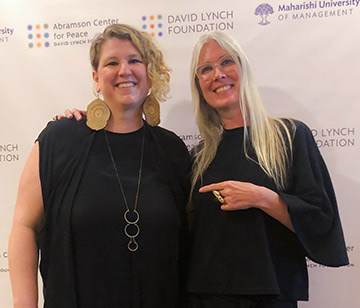
Erin Skipper and Kathryn Frazier at the Changemakers conference at Maharishi University of Management
To explore all this, I suggested that my friend Kathryn Frazier, dubbed “The Rock Star Whisperer” by The Guardian, and owner of Biz 3, a publicity, management, and consulting firm, be invited to speak at the Maharishi University of Management (MUM) Changemakers Series, co-produced by the David Lynch FoundationSM. You can watch her talk, “How to Manifest Your Great Ideas,” about how she became a transformative entrepreneur, and more talks from the Changemakers event by innovators in business and the arts.
Kathryn personifies growth and transformation in both her personal and professional lives. Her 200+ clients include some of the biggest names in music, film/tv, sports, comedy, and tech. Her roster includes Daft Punk, Skrillex, Colin Kaepernick, Migos, The Weekend, Lauryn Hill, Sigur Ros, Adult Swim, and many more. She has also integrated life-coaching into her work, to help artists manage the immense pressure and stress they’re under.
After her visit to MUM, I followed up with Kathryn to learn more about how she helps people thrive in the fast-paced entertainment industry. The following is an edited version of our conversation.
Watch Kathryn Frazier’s talk on “How to Manifest Your Great Ideas,” from the 2019 Changemakers Series.
Kathryn, when and how did you learn the TM technique?
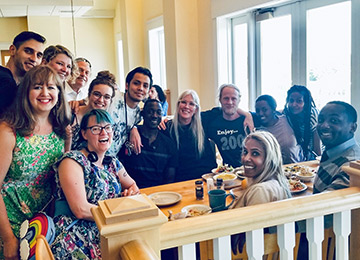
Kathryn Frazier (center) with students at Maharishi University, June 2019
I learned it about nine years ago. The reason I knew about TM was I had an intern at my business who grew up in Fairfield, Iowa, the home of MUM, and whose parents worked in the TM organization, and I was really impressed by him and his friends. I had met all of them and became pretty fascinated by what made these kids so even-keeled, and focused, and mature, and great. And they were all meditating still, in college. He was the one who started to explain TM to me.
Then I started to hear about it off and on, and one night, I don’t know how, but I ended up watching the YouTube video of David Lynch at Emerson College in Boston. After I did that, I was kind of sold. I looked up TM and went to see Carla and Duncan Brown at the TM Center in Chicago, who taught me how to do TM.
I know some of those “kids”! They are great! How has your TM practice helped you with your creativity and demanding lifestyle?
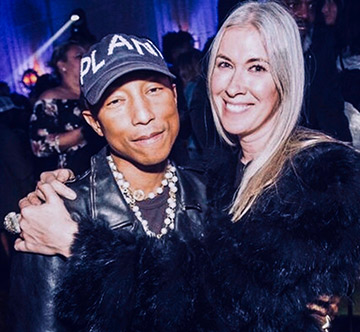
Pharrell Williams, singer, songwriter, and producer, with his friend Kathryn Frazier
Well, it’s helped me greatly. There are times where I get supposedly too busy, and I kind of fall off of it, and the effects are noticeable. With that said, I juggle a hundred balls a day, and I also have to come up with ideas and be creative. And when I am practicing TM, I am able to have all of those balls up in the air.
It’s sort of like you’re keeping your pipes clean. You just have this flow of energy through you, and you don’t feel like you have a blockage of anger or stress, and therefore you are able to have free-flowing, good, creative ideas.
Under stress, if you aren’t calm, and you start lamenting things over and over in your head, there is no way to be creative. You simply just can’t. Unless, like some musicians, your creativity is about all of your stress and problems. But for most of the world, our work does not embody that.
“When I am practicing TM, I am able to have all of those balls up in the air. It’s sort of like you’re keeping your pipes clean. You just have this flow of energy through you.” —Kathryn Frazier
The creative filmmaker David Lynch, in his book Catching the Big Fish, says, “It’s good for the artist to understand conflict and stress. Those things give you ideas. But… the more the artist is suffering, the less creative he is going to be. It’s less likely that he is going to enjoy his work and less likely that he will be able to do really good work.” Artists do suffer, but do you think suffering is necessary for their creativity?
So, here’s the conundrum when trying to help an artist. And I’ve been in the unique position of trying to help artists be successful with their art and also try to be successful in their lives, i.e. be happy. Be safe. And it is a common thing that artists have, where they feel that getting calm, getting peaceful—all of that for them equals, “I have nothing to say. I have nothing to put into my art.”
The same thing may happen if there is an artist with a mood disorder or really hardcore depression, and you want to help them through. Whether it’s through therapy, or especially with medication, there is this huge pushing back out of fear that, “What do I have to put into my art then? Where is the content? I have to be hurt, and in pain, and distraught, and struggling, because that is where most of my great creative ideas come from.”
And in some ways it’s true. A lot of our favorite artists, their music that we love to listen to is about their struggle and pain. But! Then there is the big BUT in there. We also sometimes lose those artists, and they have pretty traumatic personal lives. And there is a lot of pain and suffering and they might kill themselves, or they have addictions that kill them.
I am not saying all artists are like that, but there is definitely this tug-of-war when trying to get someone to a place of peace. And that’s where I have sent the David Lynch book to many artists, to try to change that perspective. To try to put a different lens on it.
Because if you are experiencing more clarity, and focus, and peace, you actually have a lot more ideas and imaginative thoughts rise up and come out. It’s a fallacy that being more grounded means you’re not as creative.
“If you are experiencing more clarity, and focus, and peace, you actually have a lot more ideas and imaginative thoughts rise up and come out. It’s a fallacy that being more grounded means you’re not as creative.”
—Kathryn Frazier
How do you help artists find a balance and help them make themselves and their health a priority? And what challenges do you find?
The way that I make them find the balance is to really explain that there is a balance, and trying to get someone to believe that there can be a balance. Frankly, I have often pointed to David Lynch. I have pointed to Martin Scorcese. I’ve pointed to people who are some of the greatest creators of our time who openly speak about how Transcendental Meditation has helped them to do just that. So, it’s leading by example. It’s showing that there’s another way.
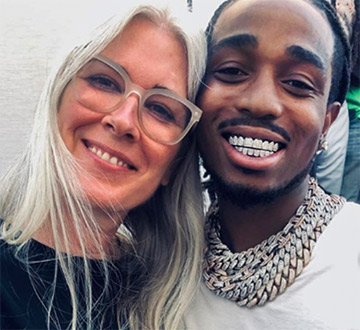
Backstage at the BET Awards, Kathryn Frazier and rap artist Quavo, of the hip-hop and trap music trio Migos
And if you can get someone feeling more grounded and happy, usually they’re not going to reject it. They can actually start to feel that way. It’s sort of leading someone to a better place. Because at the end of the day, you have your art, and you make it, and then you put it into the world. But you have to live in your own life constantly. And if that is feeling hard, over time, that will wear you down.
So, having conversations like that, and showing them, and encouraging them to learn TM and also try other tools. They get to a better place, and they start to feel that and see that they can be more effective.
“The way that I make them find the balance is to really explain that there is a balance, and trying to get someone to believe that there can be a balance.” —Kathryn Frazier
A lot of your clients have addiction and mental health issues. Do you also recommend recovery modalities?
It goes case by case. I look at the person, and I see what’s happening with them. If someone has some mental situation or mood disorder, I very strongly encourage help and therapy. I, of course, always bring up Transcendental Meditation.
If someone has an addiction issue, if it’s a really severe one, then I push very strongly for a rehab situation. I have walked many artists into 12-step programs. That’s a common thing, whether it’s for sex and love addiction, drugs, alcohol—they’re all related.
It depends on what it is. I address sleep. I address diet—a lot of times diet is a huge one. You don’t drink water. How could you possibly feel good and stable when all you put in your body is sugar and nothing whole?
So it’s a holistic approach all around.
“I address sleep. I address diet—a lot of times diet is a huge one. You don’t drink water. How could you possibly feel good and stable when all you put in your body is sugar and nothing whole?” —Kathryn Frazier
In addition to prayer, meditation is a big part of recovery. When Bill Wilson, the co-founder of Alcoholics Anonymous, learned TM, he said he understood the 11th step for the first time. Do you have meditating clients in recovery programs?
Yeah, I have a few clients right now who have learned TM, and they go hand in hand. When you’re in a recovery program, it’s one day at a time. It’s a moment-to-moment string of choices. And meditating is a really powerful way to get us to be present, and to help us get past addictive cravings, and to work through the pain that comes up when you’re working through a recovery program.
And TM, to me, is the most effective way for people to find real relief, when they are in withdrawal, in particular. I have had some people in withdrawal in the sex and love addiction program, and TM brings incredible relief when you are preoccupied with what you want, if that’s not healthy, or you are confused about what love is. So it’s an extremely effective tool when you are dealing with addiction and recovery.
“TM, to me, is the most effective way for people to find real relief, when they are in withdrawal, in particular.” —Kathryn Frazier
When you visited MUM to speak at the Changemakers conference, we did a TM Checking session. What value do you see in the personal Checking and follow-up that is available to people who practice TM?
That seems so important to me. You know, all the years I have been meditating, I had never had a Checking session. I just kind of thought, “Well I know how to do it.” I just didn’t put the value in it. And then when I had a Checking, it felt so powerful. It almost felt like I had never meditated before.

Kathryn Frazier with rap artist Offset, of the hip-hop and trap music trio Migos
The first meditation I had during the Checking with you, I experienced these physical signs of deep relaxation I haven’t had in meditation since I first started TM, and had forgotten. So that was really interesting. And now I actually ask my other TM friends, “Do you ever get Checkings?”
As a matter of fact, I already want another one. It’s not that I want to be constantly checking in, but I think it’s important if you feel like you’re a little off in your practice and you need that; it’s good to listen to yourself.
And now I realize that there’s a reason why the TM organization exists in the way that you don’t just go in and learn it and then you’re done, and that’s that. Community, and that ability to come back for TM Checking, and that alumni status that you get is actually very important to keep your TM practice optimum.
“Community, and that ability to come back for TM Checking, and that alumni status that you get is actually very important to keep your TM practice optimum.” —Kathryn Frazier
What motivated you to become a life coach after all these years as a successful publicist and manager?
I was motivated to seek a path where I was really officially helping people more, just because it felt like my purpose on this planet. I have been helping people in health unofficially for 20 years, and for 30 years I have been helping people with pushing their art to the world and making people care. But it just felt so much more important to actually focus on helping people. It gives me more purpose. It actually helps, slowly, one person at a time, to bring change and good into the world.
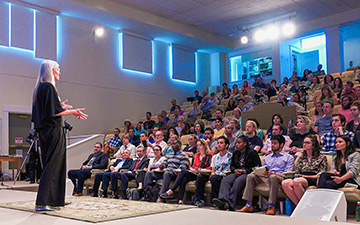
Kathryn Frazier sharing her insights with the community at Maharishi University
And after watching what fame does to people, and watching people become very well-known and watching their lives become a lot less happy… Watching a lot more addiction. Watching a lot more mental instability, and depression, and anxiety… It was so all-encompassing all around me, that it just started to seem like, “What’s the point of what I am doing?” I started to question my own purpose, and I just wanted to flip it.
And I also saw a huge opening, a gap in the industry, in the entertainment industry. There are all these people around, really skilled at getting people moving and well-known and getting careers going. But I was not seeing people who knew what to do when the artists weren’t doing well. And not only that, people that are in the industry didn’t know what to do. Of course, there are great things, especially things like the Grammy’s MusiCares, which is such a cool, incredible organization.
But I just decided to switch gears, study and do the hours to become an ICF [International Coach Federation] certified life and relationship coach, and bring it into my world. I use it daily with so many clients—and not just with artists. It’s with managers too, clients who are running labels, running media.
It’s helping the artists. It’s helping the people helping the artists. It’s putting your oxygen mask on first before you can help others. And it’s been really great. It’s been really fulfilling to watch people’s lives get better.
It’s so cool. It’s really, really important work that you’re doing. Thank you for doing it.
Thank you for caring and noticing!
“I was motivated to seek a path where I was really officially helping people more, just because it felt like my purpose on this planet… It actually helps, slowly, one person at a time, to bring change and good into the world.” —Kathryn Frazier
Watch inspiring talks by other transformative entrepreneurs on the MUM Changemakers event page
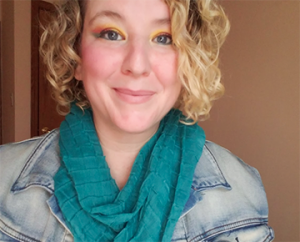
Erin Skipper was co-director of the Los Angeles TM Center 2012–2019 and recently relocated to Fairfield, Iowa. You could say TM is in her DNA. She is a 4th-generation TM practitioner and 2nd-generation TM teacher, and a graduate of Maharishi University of Management. Currently she is working on TM program–related media projects, which allows her to share people’s journey with their TM practice. As the David Lynch Foundation’s former director of social media and community outreach, she applied her passion for music by producing concerts and hosting Eden’s Hour, a weekly radio show featuring musicians she met through DLF and the DIY scene in her hometown, Seattle.

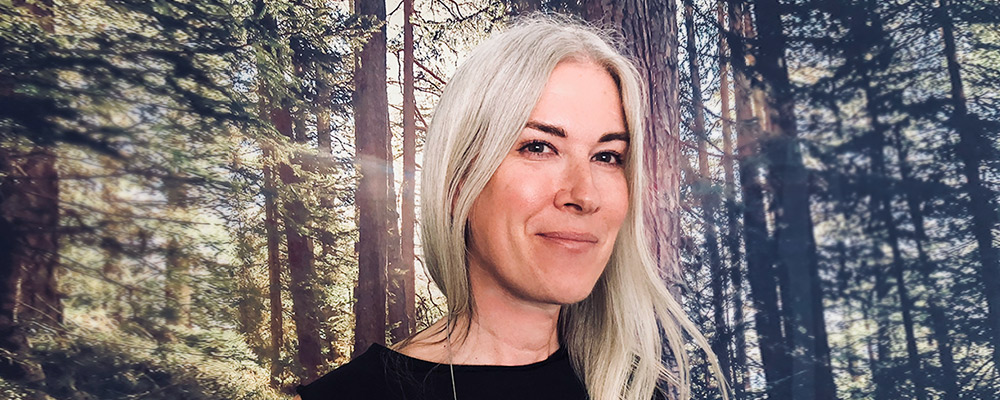
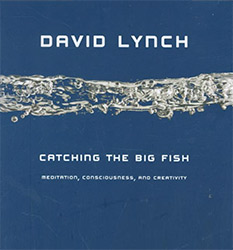
Comments
YOU MAY ALSO LIKE
Maharishi
The Truth about Creativity and Suffering
Is suffering necessary to create? Maharishi explains the real relationship between creativity and suffering in this talk collected in The Flow of Consciousness: Maharishi Mahesh Yogi on Literature and Language.
Creativity & the Arts
Achieving the Extraordinary
Contemporary icons speak about TM and creative renewal. “It has given me effortless access to unlimited reserves of energy, creativity, and happiness deep within.” —David Lynch
Better Health
AA Co-Founder Bill Wilson, TM, and the 11th Step | 3:47
“I didn’t fully understand the 11th step until I started TM,” said Bill Wilson, legendary co-founder of Alcoholics Anonymous, when he learned the TM technique.